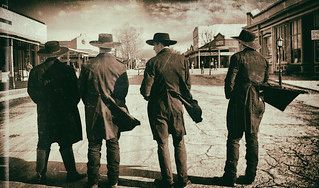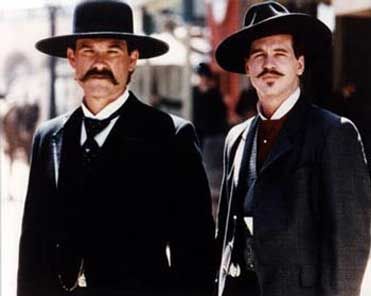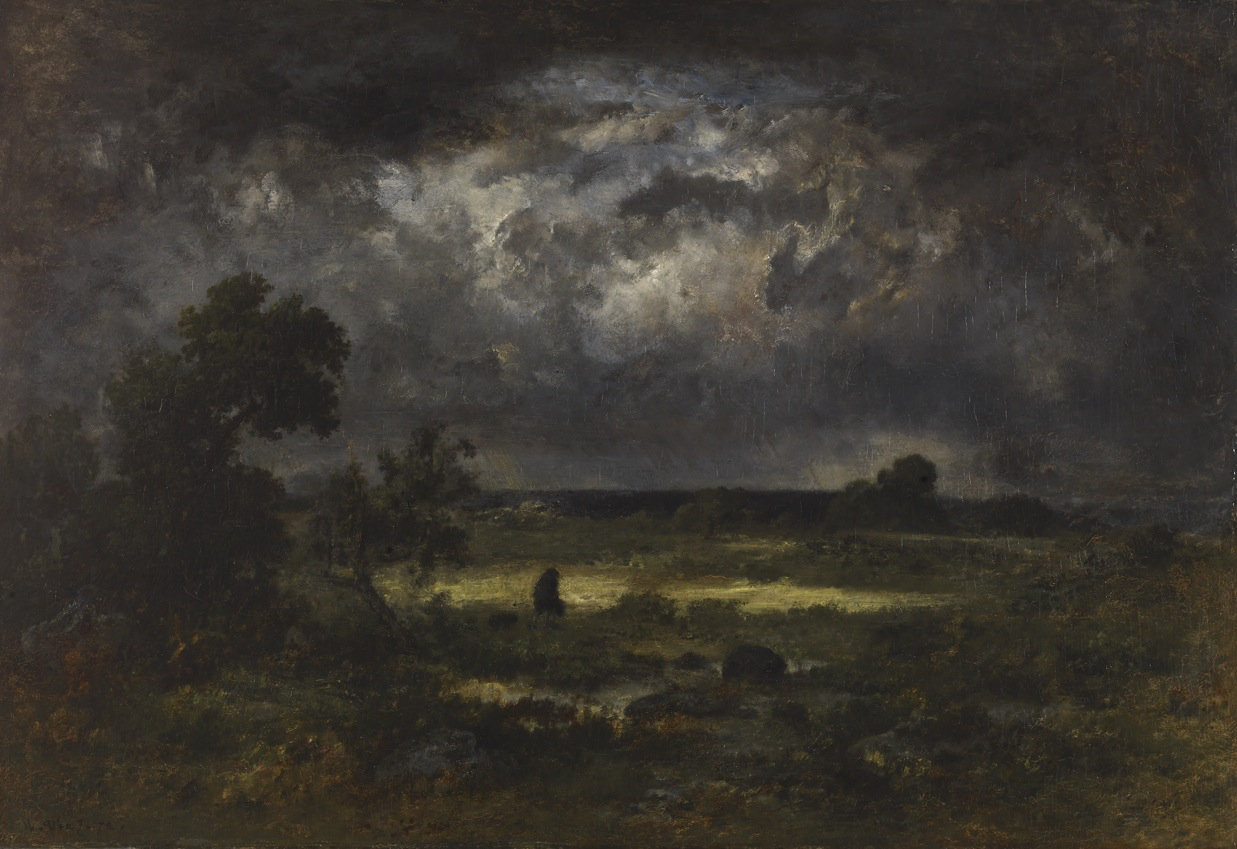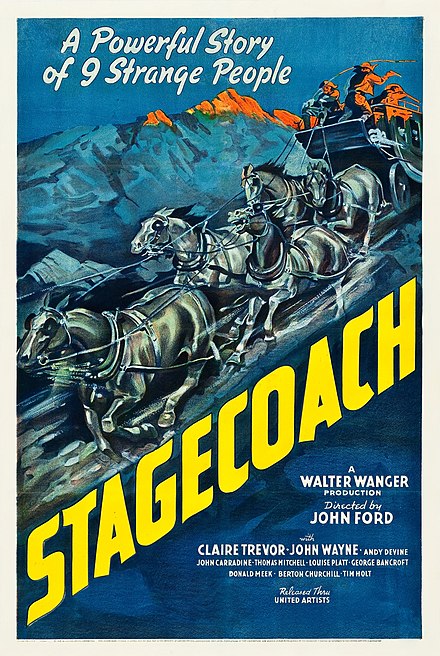
No music. No noise. Just desert air and death hanging thick in the stillness. Then that voice—low, calm, steady: “I’m your huckleberry.” It’s been more than thirty years since *Tombstone* rode into theaters, but the duel between Val Kilmer’s Doc Holliday and Michael Biehn’s Johnny Ringo hasn’t aged a second. It remains a masterclass in tension, a scene where quiet anticipation speaks volumes louder than any gunshot. And now, with Val Kilmer’s own harrowing battle with throat cancer, that whispered farewell through gun smoke feels heavier, imbued with a poignancy that transcends mere acting. This was a moment that cemented Doc Holliday’s iconic status in Western lore, a figure of deadly elegance and defiant resolve.
Most Western shootouts go for flash, for the thunderous spectacle of flying bullets and chaotic pandemonium. This one, however, goes straight for the throat. We witness Ringo, pacing beneath the trees, hand twitching with a mixture of swagger and demons, expecting Wyatt Earp. Instead, from the shadows, a figure steps out—pale, sick, yet undeniably smiling. It’s Doc Holliday, embodying death dressed for a poker game, one hand loose, the other poised. “You look like someone just walked over your grave,” he tells Ringo, and from that chilling exchange, there’s no turning back. It’s a testament to Kilmer’s performance that a sick man’s subtle menace could outshine any conventional hero.
But here’s the undeniable truth about legends: the silver screen, as brilliant as it often is, frequently just scratches the surface. “Movies tossed Doc a cool hat and a quick hand. The truth is, his real life carried more weight, more scars, and way more heart than Hollywood ever told.” We’re talking about a man whose actual biography is a sprawling, dramatic epic, far richer and undeniably more complex than any script could fully capture. So, prepare to peel back the layers and discover the astonishing true story of Doc Holliday, proving why his legacy resonates so deeply, even beyond that perfect cinematic moment, as we uncover the real man behind the myth.

1. **His Wealthy Southern Family Origins**John Henry Holliday’s entry into the world was hardly the stuff of dusty trails and hardscrabble beginnings. “Sprawling estates, white-pillared mansions, and gentlemen in crisp suits. That was John Henry Holliday’s world in Griffin, Georgia, where he was born in 1851.” This isn’t the typical backstory for a man who would become synonymous with the untamed American frontier. Instead, it paints a picture of a childhood steeped in the genteel, aristocratic traditions of the antebellum South, a profound contrast to the rough-and-tumble life that fate would eventually steer him towards. It’s almost jarring to imagine such a figure emerging from such refined surroundings.
His father, a seasoned veteran of the Mexican-American War, ensured the Holliday family lived comfortably and commanded respect among society’s elite. Young John Henry wasn’t just financially secure; he was positioned within a social stratum where a future of civic duty, professional success, and respectability was practically predestined. This foundation, steeped in privilege and societal expectations, would prove to be a fascinating counterpoint to the wild trajectory his life would soon take. It highlights a narrative of dramatic personal transformation.
The image of a sophisticated Southern gentleman, refined and educated, stands in stark opposition to the pale, coughing gambler so memorably portrayed in popular culture. This initial wealth and status provide a captivating dramatic irony to his eventual notoriety, highlighting either a dramatic fall from grace or, perhaps, a deliberate and defiant abandonment of a predefined, comfortable path. It forces us to ponder the forces that could compel a man born into such luxury to trade a life of white-pillared mansions for the perilous uncertainty of saloons and gun smoke.
Read more about: You’re Not Crazy! 10 Movies We Swear Exist Even If No One Else Remembers Them

2. **His Classical Education and Linguistic Mastery**Beyond the velvet curtains of his affluent upbringing, young Holliday was a prodigious intellect, far exceeding the common expectations of his era. “Young Holliday, educated at the finest institutions, mastered Latin, Greek, and French by his teenage years.” This isn’t just a casual footnote in his biography; it’s a profound revelation of a mind as sharp and formidable as any quick-draw hand. His early mastery of classical languages speaks volumes about his inherent intelligence, his dedication to learning, and the intellectual rigor he applied to everything he pursued.
It’s a detail that often goes missing in cinematic portrayals, leading many to overlook this crucial aspect of his character. “Bet you didn’t pick that up while watching Wyatt Earp. Instead of just dealing cards, he could translate Homer’s Iliad on a whim.” This fact alone utterly shatters any simplistic “gambler” stereotype, revealing a depth of character and a breadth of knowledge rarely attributed to him. He wasn’t merely adept at shuffling cards; he possessed the capacity to effortlessly pivot between intricate ancient epics and nuanced high-stakes poker.
In a raw and untamed frontier, populated by individuals defined by brute strength or street smarts, Doc Holliday stood out as a true anomaly. Not just for his deadly prowess but for his formidable academic intellect. His profound ability to navigate complex languages and classical literature hints at a keen, analytical mind, a trait that undoubtedly served him with unparalleled advantage, whether dissecting a hand of faro or engaging in tense verbal sparring. This intellectual might was, in its own way, as potent and dangerous a weapon as any pistol he ever wielded.

3. **His Early Career as a Professional Dentist**Before the echoes of gunshots and the clatter of poker chips defined his existence, Doc Holliday carved out a respectable, if brief, career in an entirely different arena. “In 1872, Holliday held a diploma from the Pennsylvania College of Dental Surgery, making him one of Georgia’s youngest licensed dentists.” This isn’t a mere historical curiosity; it’s a fundamental piece of the puzzle that utterly defies easy categorization of the man. For a period, he was a trained professional, dedicating himself to a meticulous and demanding craft that required precision, steady hands, and a keen eye for detail. This was a future built on respectability.
Adding to the narrative of his early competence, there’s a fascinating detail about his initial licensure. “Since he graduated 5 months before he turned 21, the minimum age to practice dentistry, the College held his degree until he officially clocked 21.” This small but telling fact underscores his precocity and early competence; he was ready to embark on a legitimate and promising career even before he legally could. It speaks to a driven young man, equipped with both the skills and credentials that should have promised a comfortable, even distinguished, future in a burgeoning field.
The profound juxtaposition of this early life — filled with the sterile instruments of dentistry and the precise pursuit of oral hygiene — with his later existence among smoky saloons, dangerous gunfights, and dusty, lawless trails is nothing short of astonishing. It underscores a dramatic turn of fate, transforming a man destined for a respectable, settled life into a wandering, defiant legend. His time as a dentist adds an unexpected layer of depth to his character, making his subsequent, radical transformation all the more compelling and tragic in equal measure.
Read more about: Smile! You’re On Camera! We Found the 12 Actors Whose Grins Are IMPOSSIBLE Not to Recognize!

4. **His Devastating Tuberculosis Diagnosis**The trajectory of Doc Holliday’s respectable, privileged life was irrevocably altered by a cruel twist of fate that struck with devastating precision. “Tragedy struck early when Doc began coughing up blood, a sure sign of tuberculosis.” This wasn’t a gradual decline into ill health; it was a sudden, brutal blow, a definitive moment that rerouted his entire existence and cast a long, inescapable shadow over every subsequent decision he made. The grim weight of this diagnosis hangs heavy over his legend, explaining so much of his seemingly reckless bravado and his defiant refusal to bend.
Doctors, observing his rapid deterioration, offered a stark and unsparing prognosis: “Doctors gave him months to live, not decades.” This cold, hard reality provided the backdrop for the remainder of Doc’s life, transforming it from a leisurely, predictable stroll into a desperate, accelerated sprint against an unseen enemy. When presented with such an immediate death sentence, the conventional rules of society, the long-term plans, and the very concept of a future tend to lose their rigid grip. He knew his time was short, forcing him to live with an intensity that few could comprehend.
It was this profound desperation that served as the catalyst for his migration. “Desperation drove him West, seeking dry air to prolong his life, but in truth, he carried doom with every breath he took.” This wasn’t an adventurous spirit seeking fortune or fame; it was a man running from the inevitable, chasing a whisper of hope—a desperate palliative—in the vast, unforgiving frontier. The West, often romanticized as a place of new beginnings and boundless opportunity, became for Doc a temporary reprieve, a place where he would wage his final, losing battle against an internal, insidious enemy, a relentless shadow he could never outrun.
Read more about: A Tribute to Talent: Remembering 13 Iconic Actors Whose Brilliant Careers Were Cut Short in Their 40s and 50s

5. **The Abandonment of His Dental Practice**For a time, Doc Holliday wasn’t just practicing dentistry; he was excelling at it, building a reputation for excellence that promised a distinguished future. “Partnered with Dr John A Seegar, Holliday won awards for dental excellence in Dallas and later opened his own practice.” Here was a man who, despite his privileged upbringing, applied himself diligently to a skilled trade, earning recognition for his meticulous work. He wasn’t simply earning a living; he was mastering his craft, demonstrating a professional dedication that speaks volumes about his inherent capabilities and ambition.
However, the very disease that had forced his westward journey now began to actively dismantle his chosen livelihood. “But coughing fits from tuberculosis made precision work impossible.” Imagine the sheer frustration, the bitter irony of a brilliant mind and skilled hands—once celebrated for their dental precision—rendered useless by an internal affliction that slowly and relentlessly consumed his vitality. His body, once capable of such delicate work, was now betraying his intellect, forcing a profound and profoundly painful pivot from a respectable profession to a far more dangerous existence.
This insurmountable obstacle marked the definitive end of his dental dreams, forcing a complete re-evaluation of his path. “His dream faded…and before long, gambling replaced dentistry as his main livelihood.” This wasn’t a choice born of caprice, a sudden desire for wild adventure, or a rejection of societal norms simply for the thrill of it. It was a pragmatic, almost brutal necessity, a stark consequence of his deteriorating health. The elegant, precise tools of a dentist were exchanged for the dangerous, unpredictable world of cards and chance, a symbolic and tragic transformation reflecting his desperate circumstances.
Read more about: A Chronicle of Carnage: Unveiling 12 Disturbing Realities of Serial Killers Who Defied Sanity

6. **His Desperate Turn to Gambling for Survival**With his professional life as a dentist irrevocably closed off, Doc Holliday had to find a new way to exist, a new arena where his formidable intellect and quick reflexes could be put to use. “Forced to survive by wit alone, Doc slid into the gambler’s world like a shadow at dusk.” This wasn’t a glamorous foray into the underworld, nor was it a whimsical career change. It was a calculated, desperate move by a man backed into a corner, relying on his sharp mind and an almost defiant refusal to yield to his illness. The stakes were no longer merely money; they were his very existence, a daily wager against an unforgiving fate.
The transformation of his professional sphere was both literal and metaphorical, a stark indicator of his changed life. “Poker tables became his clinics; dice and faro boards replaced his dentist’s chair.” The precision, observation, and analytical skills once applied to diagnosing dental ailments were now directed at reading opponents, calculating complex odds, and mastering the subtle art of the bluff. His intellectual gifts, once dedicated to healing, were now repurposed for deception, gain, and the cutthroat competition inherent in the gambling dens of the frontier. It was a brutal but effective adaptation.
Hollywood often romanticizes this shift, portraying Doc as a natural, almost aloof master of the game. Yet, the reality, as the context hints, was far grimier. “In Tombstone, Val Kilmer captured a bit of this shift, but few films ever reveal how desperate his choice was.” It wasn’t a rebellion for rebellion’s sake; it was a grim, daily struggle for subsistence. The “cool” gambler persona, so often seen on screen, conceals the underlying desperation, the constant battle against his rapidly failing health and an indifferent, unforgiving world. His gambling wasn’t a pastime; it was his tenuous, life-sustaining thread.

7. **His First Run-ins with the Law: Indictments and Arrests**Doc Holliday’s initial confrontations with the established legal order were, perhaps surprisingly, less about dramatic gunfights and more about the prosaic reality of frontier vices. “Holliday’s first brush with the law wasn’t the gory spectacle movies suggest. In May 1874, he and a dozen others were indicted for illegal gambling in Dallas.” This detail grounds his early notoriety in the common illicit activities of the time, revealing a gradual drift into illegality rather than a sudden plunge into violent crime. It was less about blazing pistols and more about skirting the edges of what was permissible in a rapidly developing society.
However, the transition from simple indictment to direct confrontation was swift and definitive. “His first arrest followed in January 1875, not for cards, but for exchanging gunfire with a saloon keeper.” Ah, here it is – the moment the stakes undeniably escalated. From the relative anonymity of an illegal card game, Doc transitioned into an actual armed conflict, a clear indicator that his trajectory was veering sharply into the dangerous, volatile underworld of the frontier. This wasn’t just a minor infraction; it was a serious incident, a chilling glimpse into the personal volatility and readiness for violence that would come to define his legendary status.
These early encounters with the law, though perhaps less dramatic than the celebrated gunfights of his later years, were absolutely crucial in shaping the nascent reputation of Doc Holliday. They marked his undeniable transition from a respectable professional seeking a new livelihood to a genuine, formidable figure of the frontier underworld, a man who, when pushed or threatened, was unequivocally willing to answer with lead and steel. This was the initial, raw stage of the legend taking hold, a testament to his adaptability in a brutal world and his growing willingness to embrace its darker necessities.

8. **He Became A Notorious Figure Across The West, Not Just Texas And Kansas**After his initial brushes with the law in Texas, Doc Holliday didn’t simply fade into the shadows. Oh no, that’s not how legends are forged. Instead, his notoriety began to ripple across the vast expanse of the American West, transforming him from a local hazard into a bona fide, if feared, celebrity. It was a rapid-fire escalation of reputation, fueled by his lethal combination of intellect, desperation, and an unnerving readiness for confrontation. He was, to put it mildly, a man who left an impression, often a bloody one.
His restless spirit, spurred on by the relentless cough of tuberculosis and the constant need for drier air, propelled him from one frontier outpost to another, each stop adding a new chapter to his growing infamy. We’re talking about a man who, “after leaving Texas, Holliday headed for Denver, dealing faro and fighting gamblers like Bud Ryan with knives instead of pistols.” This wasn’t some casual vacation; it was a desperate, high-stakes migration, where his very survival depended on his wits and his willingness to engage in the brutal, messy realities of the gambling world.
From the high-altitude gambling halls of Denver, Doc chased the elusive promise of fortune through the rugged landscapes of Wyoming and the notoriously lawless boomtown of Deadwood. By 1877, having miraculously survived a gunshot wound in Texas, his already formidable reputation had hardened into an almost mythical legend across the entire frontier. He wasn’t just *known* anymore; he was *feared*, a specter of deadly elegance whose name commanded respect—and often, a wide berth—wherever he roamed.

9. **He Was Better Known For His Knife Skills Than His Gunmanship**When most of us envision Doc Holliday, the image is often of a lightning-fast gunslinger, a blur of lead and smoke. Yet, the truth, as always, is far more intricate and, frankly, far more terrifying. While Hollywood rightly celebrates his pistol prowess, it’s his chilling mastery of a different kind of weapon that truly underscored his deadly efficiency. This wasn’t just a man who could handle a gun; this was a man who preferred a more intimate, and arguably more lethal, form of confrontation.
“Think Doc was just another quick-draw artist? Think again. He was lethal with a knife, often favoring a blade over a pistol when fights got messy.” This preference for cold steel speaks volumes about the brutal realities of frontier conflict. It suggests a man who was not afraid to get up close and personal, to engage in a kind of violence that demanded absolute precision, steady nerves, and an almost surgical ruthlessness. It’s a detail that adds a visceral, unsettling layer to his legendary reputation.
Indeed, this isn’t just a quirky historical footnote; it’s a testament to his raw, pragmatic approach to self-preservation. “Westerns worship his gunplay, but eyewitnesses swore he could carve an enemy faster than most could draw.” Imagine that: a man so utterly adept with a blade that he could disarm, disable, or dispatch an opponent before they even cleared leather. It shatters the romanticized image of a distant shootout with the gritty, terrifying reality of a close-quarters engagement, cementing Doc as a multi-talented force of deadly nature.

10. **He Was Once Charged With Murder, But The Charges Were Dropped**Living on the edge of the law in the Old West meant that accusations, especially serious ones, were almost an occupational hazard for men like Doc Holliday. And while his story is replete with gunfights, one particular incident reveals the perilous line he walked, culminating in a murder charge that Hollywood rarely dramatizes. This wasn’t just a barroom brawl gone bad; it was a deadly confrontation born from the very essence of his chosen profession: high-stakes gambling.
“Accused but never convicted, Doc faced a murder charge after a deadly poker game in Fort Griffin, Texas.” This wasn’t some random act of violence; it was a direct consequence of the volatile environment of frontier gambling, where cheating was a capital offense and a man’s life could hang on the turn of a card. It paints a stark picture of the constant pressure and the lethal consequences inherent in his daily life, where every hand dealt could become a matter of life or death.
The context of the killing further underscores Doc’s pre-emptive, decisive, and utterly ruthless nature. “When Ed Bailey tried to draw a gun after being caught cheating, Doc struck first with a knife.” This isn’t just self-defense; it’s a chilling display of his instinct for survival, his ability to read a situation, and his unwavering willingness to act with deadly force. He didn’t wait; he *acted*, eliminating the threat before it could fully materialize, showcasing the razor-sharp reflexes that made him so formidable.
That he “somehow dodged conviction” after being “detained at the Planter’s Hotel” is another testament to the wild, often chaotic nature of frontier justice. Whether it was a lack of concrete evidence, the sheer difficulty of conviction in the untamed West, or perhaps even the fear his reputation inspired, Doc managed to escape the hangman’s noose, adding another layer of mystique to his already legendary status. It’s a reminder that not every act of violence led to immediate, clear-cut justice, especially for men like Holliday.
Read more about: 13 Celebs Who Broke the Internet With a Single Photo: From Viral Hits to Unforgettable Dramas

11. **A Silver Boom Lured Him Toward Tombstone: A Date with Destiny**While Doc Holliday’s wanderings across the West might seem aimless to some, a powerful magnet was drawing him, and indeed many others, toward a specific dusty patch of Arizona: the booming silver strike of Tombstone. It wasn’t just the promise of wealth that pulled him, though that certainly played a part. It was a call to destiny, orchestrated in large part by the man he considered a brother: Wyatt Earp. Their paths, once again, were destined to converge in a place that would etch their names into history.
“By 1879, Wyatt Earp convinced Doc to head for Arizona Territory.” This wasn’t a casual suggestion; it was a deliberate invitation, a planned convergence of fortunes and fates. The Earps were always looking for opportunity, and Doc, ever the pragmatist, understood that where the Earps went, there was often action, opportunity, and, yes, trouble. He was drawn not just by the prospect of silver, but by the gravitational pull of loyalty and shared ambition.
Initially, Doc lingered in Prescott, “chasing gambling profits” while the Earps pushed ahead. He was a gambler first, always looking for the surest bet, the quickest score. Yet, the inevitable call of Tombstone, where “tensions with outlaw Cowboys were heating up, and history was about to call his name,” was too strong to ignore. He knew where the real action would be, where his skills—both at the card table and with a gun—would truly be needed.
Ultimately, it was the unbreakable bond of brotherhood that sealed his fate. “Doc packed his bags and shadowed Wyatt westward, determined to stand beside him. If Wyatt Earp gave you the impression it was a coincidence, think again—this was loyalty plotted on a map and sealed in blood.” This wasn’t a chance encounter; it was a conscious, deliberate choice to stand by his friend, a decision that would plunge him into the crucible of the O.K. Corral and forever cement his place in Western legend.

12. **Accused Of Stagecoach Robbery, Saved By Loyalty**Even for a man with Doc Holliday’s notorious reputation, being accused of a crime as heinous as stagecoach robbery, especially one involving murder, was a devastating blow. It threatened to end his tumultuous life not in a blaze of glory, but in the ignominy of a hangman’s noose. This particular dark chapter showcases the precariousness of frontier life, but also, crucially, the profound loyalty that bound Doc to his closest allies, proving that his unwavering commitment to his friends was reciprocated when his life hung in the balance.
The setup for this near-fatal accusation was a classic frontier tale of betrayal and manipulation, rooted in a personal quarrel. “After a fight with Big Nose Kate (a dance hall woman), enemies tricked her into falsely accusing Doc of a deadly stagecoach robbery.” Imagine the chilling realization for Doc: his freedom, his life, suddenly hinging on the word of a jilted lover, swayed by his enemies. It was a brutal reminder that even a man as dangerous as Holliday was vulnerable to the machinations of those he had crossed.
“Arrested and humiliated,” Doc found himself in the direst of circumstances, staring down a conviction that seemed all but certain. This was no minor offense; stagecoach robbery, especially with a fatality involved, meant a swift trip to the gallows. Yet, in a powerful testament to the relationships he had forged, his conviction was averted when “witnesses—and a sober Kate—cleared his name.” It’s a dramatic turn that highlights the complexities of frontier justice and the indispensable value of true allies.
This incident wasn’t just another close call; it was a powerful affirmation of the deep, reciprocal loyalty that defined his relationships, particularly with Wyatt Earp. Had his friends not rallied, had Kate not recanted, Doc’s story would have ended far sooner, and far less heroically. It proves that for all his self-sufficiency, Doc Holliday was a man who, when truly in need, could count on the unwavering support of those who understood and respected his unique, dangerous code.

13. **The Earp Vendetta Ride and Its Aftermath: Forging an Enduring Legend**While the Gunfight at the O.K. Corral is arguably the most famous chapter in the Earp-Holliday saga, it was the chilling, calculated brutality of the Earp Vendetta Ride that truly solidified Doc Holliday’s image as an unshakeable, lethal force, forever etching his name into the bedrock of Western folklore. This wasn’t just a response; it was a declaration, a brutal campaign of retribution that turned lawmen into avengers and cemented the legends of all involved. It was the ultimate, visceral act of loyalty and vengeance, defining Doc’s readiness to stand with his chosen family, no matter the cost.
“The Earp Vendetta Ride was revenge, plain and brutal.” This phrase alone cuts through any romanticized notions. After the senseless murder of Wyatt Earp’s brother Morgan, a line was crossed, transforming the pursuit of justice into an unwavering hunt for retribution. “Wyatt, Doc Holliday, and a handpicked posse turned bounty hunters.” Doc, the consumptive gambler, stood shoulder to shoulder with his friends, a pale harbinger of death, embodying the fierce, unyielding spirit of frontier justice when the law itself proved insufficient. His presence was not just support; it was a statement.
Over the course of “a couple of weeks, they hunted and gunned down Cowboy outlaws across Arizona, leaving a trail of bodies.” This was Doc Holliday in his element: precise, deadly, and utterly committed to the task at hand. His actions during this ride weren’t just about pulling a trigger; they were about unwavering solidarity, a grim determination to see justice, however brutal, served for his friend. It showed the depth of his character, the lengths to which he would go for those he loved, shattering any lingering doubts about his moral compass when loyalty was on the line.
Unsurprisingly, this audacious campaign of vengeance had profound consequences. “After, where Doc helped kill three Cowboys and Stilwell turned up riddled with bullets, a warrant for Holliday’s arrest made him a fugitive.” This wasn’t a hero’s triumphant return; it was a desperate flight, transforming him from an avenger into a marked man, dodging both official justice and the vengeful kin of those he’d helped eliminate. He was a man forever running, living out the final, tragic chapters of a life defined by loyalty, defiance, and a relentless dance with destiny, cementing his myth as a tireless rebel.
And that, dear readers, is the true Doc Holliday. Not merely a character crafted for the silver screen, but a complex, brilliant, and utterly captivating figure whose life story truly outshines any script. From the mansions of Georgia to the dusty streets of Tombstone, he defied expectations, challenged fate, and carved out a legend forged in intellect, illness, and an unshakeable loyalty that made him, unequivocally, the coolest damn huckleberry the West ever knew. His scene in *Tombstone* is legendary, but the truth behind the man? That’s the real masterpiece, one that continues to resonate with raw power and enduring fascination.”
, “_words_section2”: “1948



